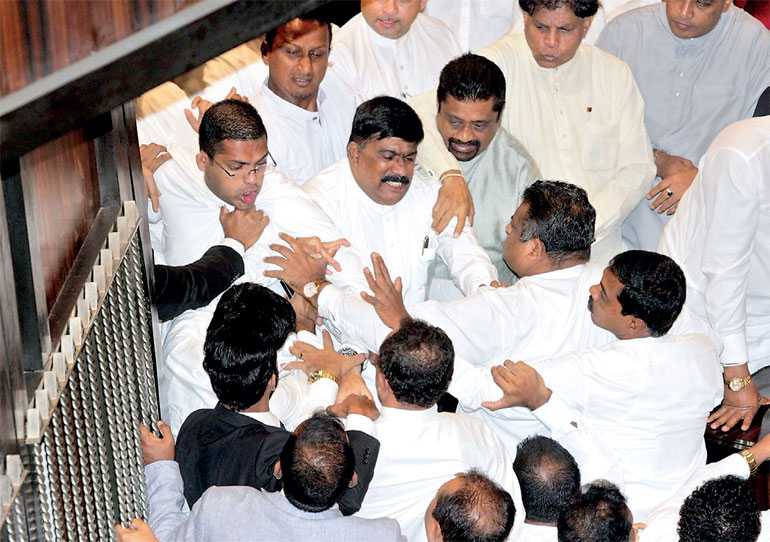Tuesday Feb 17, 2026
Tuesday Feb 17, 2026
Friday, 23 November 2018 00:00 - - {{hitsCtrl.values.hits}}

Cat’s Eye has been watching with incredulity and grave concern the events unfolding in this country since 26 October, when President Sirisena appointed former President Mahinda Rajapaksa as Prime Minister and subsequently ‘ousted’ Ranil Wickremesinghe from that office.

We see these events at once as an unprecedented political and constitutional crisis and at the same time, as yet another manifestation of a serious and disturbingly deep moral, ethical and social crisis with a long history. At the heart of it is the entrenchment of elite patriarchal power in politics, and the ways in which the existing (male-dominant) political class has come to view power as an entitlement in perpetuity. The massive, ugly brawl in Parliament on 15 November perfectly encapsulated this.
Neither elections, rule of law, constitutional provisions, separation of powers seem to matter in this political power game; nor principles, values, political loyalties, or ideologies; only how to stay in power no matter what, and how to amass as much money and wealth through whatever means while you are there.
The institutional architecture, and, in particular, the extent of power concentrated in the executive presidency, has only helped to entrench this culture based on greed, corruption, violence and impunity.
Of his beloved executive presidency, J.R. Jayewardene said, “The executive will be chosen directly by the people and is not dependent on the Legislature during its period of existence, for a specified number of years. Such an executive is a strong executive seated in power for a fixed number of years, not subject to the whims and fancies of an elected legislature; not afraid to take correct but unpopular decisions because of censure from its parliamentary party.”1
In effect, it is an executive without any checks and balances. Even though the 19th Amendment to the Constitution sought to restrict the executive powers of the President, recent events reveal the ways in which the ‘idea’ of an all-powerful executive persists and lives on, despite these restrictions.
The executive presidency: A mentality
Cat’s Eye offers you this idea: the executive presidency has not only been a way of political governance in Sri Lanka but has become a way through which we understand and meter out power. It has given us a political culture that is fundamentally corrupt and greedy at its very core. It has given us a political and social discourse which debases the idea of politics as a vehicle for social justice, moral change and public service. Sri Lanka’s executive presidency is the embodiment of a much older way of thinking about power: unchecked, political power as sheer entitlement. Capitalism relies on it and so does patriarchy.
Executive power: it is how we rule in Sri Lanka, from the State sector to the private sector; absolute power is concentrated in a few positions, if not in one. Hoards of middle-managers have immense responsibilities but no authority, no autonomy. At the end of the day, everything needs the approval ‘from the top’.
Most decision-making bodies, whether corporate or State, are comprised of men – exclusively, or at least as a majority, and mostly of elite men from the ruling classes. Decisions are often made with little to no participation from the populations which carry the reality and the economy of this country on their backs.
This top-down mentality and male dominance is not limited to parliament, but is widely embedded in how we educate, how we run our businesses, and how we run our families.
Most power is concentrated and distributed among a few families – the descendants and relatives of the same Bandaranaikes, Jayewardenas, Senanayakes, etc. – and passed out through a few big boys’ schools, where networks based on ‘quid-pro-quo’ ensure favour to those in their ranks2.
Who knows about this better than those marginalised by such concentrations of power?
JR’s legacy
It’s important to understand the executive presidency in the context of the more heinous parts of Jayawardena’s legacy, to know it is not a bloodless history.
In 1977, J.R. Jayawardena led the United National Party to a landslide victory in a historic election that determined Sri Lanka’s trajectory in many clear ways. For one thing, this election heralded an era of unprecedented violence.
By the time Jayewardene retired in 1988, the country was facing not one, but effectively two, civil wars. Tamil militants were fighting for self-determination in the north; poor youth in the south were fighting a bloody class struggle against a brutal military state.
Jayewardene is credited with ‘inventing’ Sri Lanka’s executive presidency, but he also anointed this post with other flourishes. He created the Special Task Force (STF), notorious for extrajudicial violence on behalf of the State. He passed the draconian Prevention of Terrorism Act in 1979, which has had continued devastating effects.
Jayewardene’s legacy will always carry the stain of sheer inaction – widely accepted as being deliberate – during the anti-Tamil violence of 1983. He was famously quoted as having said, “Really, if I starve the Tamils out, the Sinhala people will be happy”3, in an interview following the riots. While it was never really clear if Jayawardena held racist convictions himself, it was evident to most Sri Lankans by the 1980s that he was willing to exploit the widespread racism of the majority for political gain – which, combined with the powers of the executive presidency, turned out to be as bad. The iconic Jaffna Library burned during his time.
The executive presidency has been a tool and symbol of not just elite class power, but also ethno-religious majoritarianism and male entitlement. The hegemony of the upper-class Sinhala Buddhist male from a dynastic political family has been realised in the office of the executive president, time and again.
‘I will abolish the executive presidency’, said practically every presidential candidate Sri Lanka has ever seen, in their election manifestos. But we have never seen any president or Parliament succeeding at this. Sirisena came in on this mandate. The JVP mounted an enormous campaign during the run-up to the 2015 election around abolishing the executive presidency through the 20th Amendment. But gradually, over time, Sirisena’s own support for this move has dwindled and been replaced with a fierce determination to hold on.
It is no surprise that it is larger people’s movements (JVP-aligned and otherwise) which have consistently fought for the abolition of the executive presidency. It has been identified as sinister by most every average person of this country, particularly those of the working classes, and others who have known and lived the consequences of not being in the ‘inner circles’ of elite male privilege. Women’s movements have always sided with this as well.
The paradox of women and visibility in politics
So where are the women politicians and what do they have to say? At times, women in politics are hyper-visible and often come under heavy scrutiny. Simultaneously, they are also extremely invisible.
MPs Sudarshani Fernandopulle and Pavithra Wanniarachchi were front and centre during the brawl in Parliament. This fact is (predictably) being used by some to tarnish more than two decades of struggle by women to ensure a mandatory quota of 25% for women in Local Government elections.
There are immense structural barriers which prevent women from entering politics at all; significant blocks remain for the few who do, within their parties and in society. The few women in politics – working within political structures which have been historically male-dominated for generations and designed (by men) with the primary goal of protecting their own power bases at all costs – are compelled to navigate and negotiate power every day in ways which we rarely understand.
On the other hand, the women are not seen as equal players in the public eye and the mainstream parties rarely bother to position them as such. At the large UNP rally on 4 November, not a single woman spoke on the UNP platform, nor indeed did anyone belonging to an ethnic minority. Neither did the SLFP/SLPP platform share space with any women.
A snap election?
It is no longer just about keeping Mahinda Rajapaksa out. Systemic change is a must. A few critical things can lead us there: the abolition of the executive presidency, robust movement-building around political alternatives to the SLFP/SLPP and the UNP, and rigorous work to bring a significant critical mass of women into positions of political power.
The unacceptable behaviour of a few women in Parliament is not an argument against the women’s quota. In fact, it should indeed be seen as an argument for the women’s quota. We know what happens when women are severely outnumbered and partake in a rotten political culture based on toxic masculinity. We need more women in positions of power to truly challenge traditional power structures and practices.
This will require radical changes within every political party in this country, strengthening party democracy, and allowing women candidates and others who are typically at the fringes, to be nominated, resourced and actually supported to win. It also requires radical changes to our own ways of thinking about and exercising the people’s franchise as a society. A snap election, called on for by the Rajapaksa camp, will destroy any hope of this.
As concerned citizens, we must resist an illegal and untimely election which would once again compel us to merely recycle and reshuffle the same old cronies and racists. As a people, the time has never been more ripe for us to act in a morally proactive and politicised manner to use our voices and, if an election comes, our votes, to demand long-lasting systemic change to our political structure and culture.
(The Cat’s Eye column is written by an independent collective of feminists, offering an alternative feminist gaze on current affairs in Sri Lanka and beyond.)
Footnotes
1‘How JR Jayewardene Ushered in the Executive Presidency in 1978’: D.B.S. Jeyaraj (Daily Mirror, 2015)
2 Cat’s Eye wrote about the correlations between the big boys’ school culture of this country and culture of impunity (April 2018)
3 Daily Telegraph (11 July 1983)